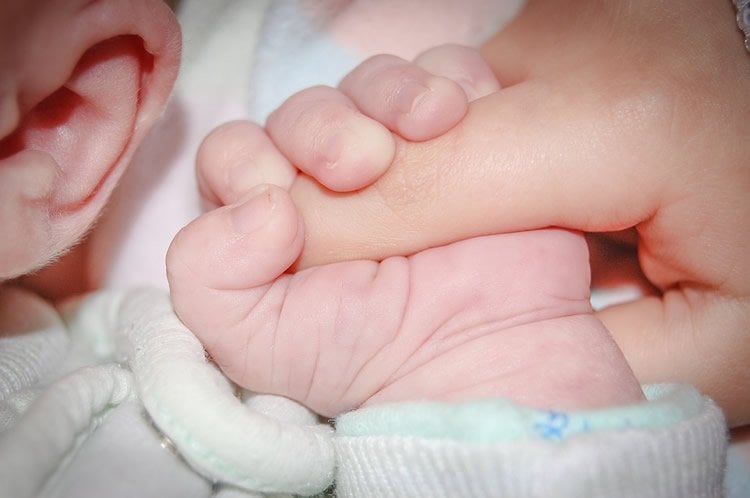Summary: According to researchers, human intelligence may have evolved in response to the demands of caring for infants.
Source: University of Rochester.
A new study from the University of Rochester suggests that human intelligence might have evolved in response to the demands of caring for infants.
Steven Piantadosi and Celeste Kidd, assistant professors in brain and cognitive sciences, developed a novel evolutionary model in which the development of high levels of intelligence may be driven by the demands of raising offspring. Their study is available online in the Proceedings of the National Academy of Sciences‘ Early Edition.
“Human infants are born far more immature than the infants of other species. For example, giraffe calves are able to stand-up, walk around, and even flee from predators within hours of their births. By comparison, human infants cannot even support their own heads,” said Kidd.
“Our theory is that there is a kind of self-reinforcing cycle where big brains lead to very premature offspring and premature offspring lead to parents having to have big brains. What our formal modeling work shows is that those dynamics can result in runaway pressure for extremely intelligent parents and extremely premature offspring,” said Piantadosi.
In other words, because humans have relatively big brains, their infants must be born early in development while their heads are still small enough to insure a safe delivery. Early birth, though, means that human infants are helpless for much longer than other primates, and such vulnerable infants require intelligent parents. As a result, selective pressures for large brains and early birth can become self-reinforcing–potentially creating species like humans with qualitatively different cognitive abilities than other animals.
Piantadosi and Kidd tested a novel prediction of the model that the immaturity of newborns should be strongly related to general intelligence. “What we found is that weaning time–which acts as a measure of the prematurity of the infants–was a much better predictor of primate’s intelligence than any of other measures we looked at, including brain size, which is commonly correlated with intelligence,” said Piantadosi.
The theory may also be able to explain the origin of the cognitive abilities that make humans special. “Humans have a unique kind of intelligence. We are good at social reasoning and something called ‘theory of mind’–the ability to anticipate the needs of others, and to recognize that those needs may not be the same as our own,” said Kidd, who is also the director of the Rochester Baby Lab at the University of Rochester. “This is an especially helpful when taking care of an infant who is not able talk for a couple of years.”
“There are alternative theories of why humans are so intelligent. A lot of these are based on factors like living in a harsh environment or hunting in groups,” said Piantadosi. “One of the motivating puzzles of our research was thinking about those theories and trying to see why they predict specifically that primates or mammals should become so intelligent, instead of other species that faced similar pressures.”

The key is live birth. According to the researchers, the runaway selection of intelligence requires both live birth of a single off spring and large brains, distinctive features of higher mammals.
“Our theory explains specifically why primates developed super intelligence but dinosaurs–who faced many of the same environmental pressures and had more time to do so–did not. Dinosaurs matured in eggs, so there was no linking between intelligence and infant immaturity at birth,” said Kidd.
Funding: The research was supported by the Eunice Kennedy Shriver National Institute of Child Health and Human Development of the National Institutes of Health.
Source: Celeste Kidd – University of Rochester
Image Source: This NeuroscienceNews.com image is in the public domain.
Original Research: Abstract for “Extraordinary intelligence and the care of infants” by Steven T. Piantadosi and Celeste Kidd in PNAS. Published online May 23 2016 doi:10.1073/pnas.1506752113
[cbtabs][cbtab title=”MLA”]University of Rochester. “Did Human Like Intelligence Evolve to Care For Helpless Babies?.” NeuroscienceNews. NeuroscienceNews, 23 May 2016.
<https://neurosciencenews.com/intelligence-evolution-neuroscience-4284/>.[/cbtab][cbtab title=”APA”]University of Rochester. (2016, May 23). Did Human Like Intelligence Evolve to Care For Helpless Babies?. NeuroscienceNews. Retrieved May 23, 2016 from https://neurosciencenews.com/intelligence-evolution-neuroscience-4284/[/cbtab][cbtab title=”Chicago”]University of Rochester. “Did Human Like Intelligence Evolve to Care For Helpless Babies?.” https://neurosciencenews.com/intelligence-evolution-neuroscience-4284/ (accessed May 23, 2016).[/cbtab][/cbtabs]
Abstract
Extraordinary intelligence and the care of infants
We present evidence that pressures for early childcare may have been one of the driving factors of human evolution. We show through an evolutionary model that runaway selection for high intelligence may occur when (i) altricial neonates require intelligent parents, (ii) intelligent parents must have large brains, and (iii) large brains necessitate having even more altricial offspring. We test a prediction of this account by showing across primate genera that the helplessness of infants is a particularly strong predictor of the adults’ intelligence. We discuss related implications, including this account’s ability to explain why human-level intelligence evolved specifically in mammals. This theory complements prior hypotheses that link human intelligence to social reasoning and reproductive pressures and explains how human intelligence may have become so distinctive compared with our closest evolutionary relatives.
“Extraordinary intelligence and the care of infants” by Steven T. Piantadosi and Celeste Kidd in PNAS. Published online May 23 2016 doi:10.1073/pnas.1506752113






